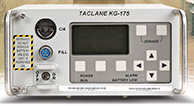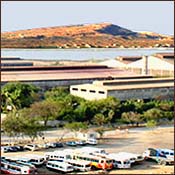 Back in 2009, this blog reported on the arrest of Chi Tong Kuok, a PRC citizen, during a layover in Atlanta while he was traveling to Panama to meet with undercover agents who believed he was involved in various illegal exports of items from the United States to the PRC. After his conviction, he appealed successfully to the Ninth Circuit which threw out two of the four counts against him and remanded for a new trial on the remaining two counts. The court held that Kuok deserved a new trial because he had improperly been denied the opportunity to present a duress defense during his trial. Kuok claimed that the Chinese government had forced him to engage in the illegal exports in question.
Back in 2009, this blog reported on the arrest of Chi Tong Kuok, a PRC citizen, during a layover in Atlanta while he was traveling to Panama to meet with undercover agents who believed he was involved in various illegal exports of items from the United States to the PRC. After his conviction, he appealed successfully to the Ninth Circuit which threw out two of the four counts against him and remanded for a new trial on the remaining two counts. The court held that Kuok deserved a new trial because he had improperly been denied the opportunity to present a duress defense during his trial. Kuok claimed that the Chinese government had forced him to engage in the illegal exports in question.
Yesterday, Kuok pleaded guilty to the remaining charges. He did so before he had the opportunity to present his duress defense during the new trial ordered by the Ninth Circuit.
This is, to say the least, an odd outcome, and it is far from clear why Kuok would just give up at this point. The evidence of duress described by the Ninth Circuit was fairly compelling.
The threat to Kuok’s family was both immediate and serious. According to his counsel’s opening statement, Zheng made it clear to Kuok that his family was being monitored, through Zheng’s actions in giving Kuok reports on his wife’s daily activities, calling her at the family’s home phone number, and sending Kuok various pictures of his wife and his son taken in public. When Kuok attempted to get out of his dealings with the government, Zheng explicitly threatened to send Kuok’s wife to a “black jail,†and told Kuok that this was “somewhere where we take people off the grid if they don’t do what we ask them to do.â€
The prosecutors made the absurd argument that Kuok was required to seek help from U.S. law enforcement authorities regarding the threat made against him in China by the Chinese government authorities, a claim which the Ninth Circuit readily dismissed:
[T]he government’s suggestion that Kuok should have cooperated with the authorities immediately upon landing in the Atlanta airport may be unreasonable, given that Kuok knew his family was still in danger of being jailed by Chinese government officials beyond the control of U.S. authorities.
The plea agreement has not yet appeared on PACER, but a local San Diego newspaper article provides some additional details that may explain this seeming about face. Apparently, the plea agreement proposed a maximum of 46 months in jail and provides that the plea agreement can be withdrawn if the district court judge does not accept that maximum. Kuok has already served 36 months, and the plea agreement provides that the defense can request a lesser sentence of time served. So, at this point, there’s a chance that Kuok will go free immediately upon the acceptance of the plea by the court. The worst that could happen under the plea is that he would spend 10 more months in jail, which is pretty much what a new trial was going to take, or that he will have a trial where the duress defense could be presented.

 Posted by
Posted by  Category:
Category: 

 The Office of Foreign Assets Control (“OFAC”) today applied
The Office of Foreign Assets Control (“OFAC”) today applied 

 A colleague brought back an interesting tidbit from the BIS Update Conference last week relating to one of the unresolved conundrums of the current export reform efforts. Under the currently proposed reforms, certain items on the United States Munitions List will be transferred to the Commodity Control List, which will transfer licensing jurisdiction over those items from the Department of State’s Directorate of Defense Trade Controls (“DDTC”) to the Department of Commerce’s Bureau of Industry and Security (“BIS”). That process is summarized in some detail in
A colleague brought back an interesting tidbit from the BIS Update Conference last week relating to one of the unresolved conundrums of the current export reform efforts. Under the currently proposed reforms, certain items on the United States Munitions List will be transferred to the Commodity Control List, which will transfer licensing jurisdiction over those items from the Department of State’s Directorate of Defense Trade Controls (“DDTC”) to the Department of Commerce’s Bureau of Industry and Security (“BIS”). That process is summarized in some detail in 

